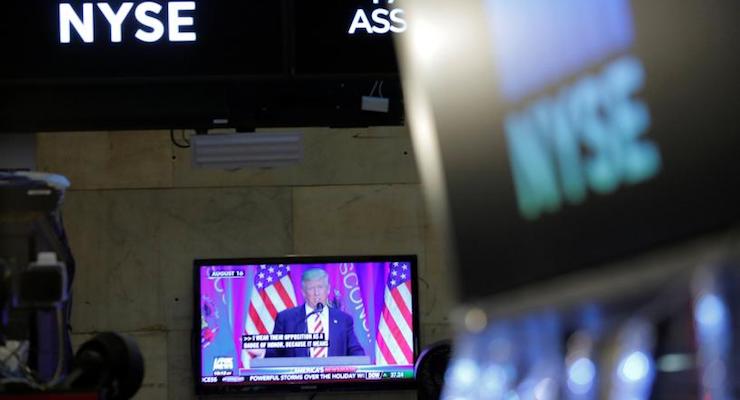

Then-President-elect Donald J. Trump is broadcast on a screen on the floor at the New York Stock Exchange (NYSE) in Manhattan, New York City, U.S. December 27, 2016. (Photo: Reuters)
With the markets trading at historic highs, average Americans are reporting a level of economic confidence under President Donald J. Trump not seen in years.
The U.S. Economic Confidence Index measured by Gallup averaged +11 in January, the highest monthly average ever measured in the 9-year trend. Further, several 3-day averages during the month also hit new highs since Gallup began tracking in 2008.
As People’s Pundit Daily previously reported earlier this month, the U.S. Economic Confidence Index spiked and peaked at +19 for the period from January 21 – 23. That represented the 3-day average after President Trump’s inauguration and shortly before the Dow Jones Industrial Average (INDEXDJX:.DJI) hit a new high.
The Dow topped 20,000 and closed above it for the first time ever in U.S. history on January 25.
Gallup’s U.S. Economic Confidence Index is the average of two sub-component questions: how respondents rate the current economic condition and whether they feel the economy is getting better or worse. In January, 31% rated the economy as “excellent” or “good,” while only 21% said it was “poor,” resulting in a current conditions score of +10.
That marking the highest monthly reading for this component since 2008. Overall, with the exception of January and February 2015, the index was in negative territory throughout the Obama presidency.
In February, Rasmussen Reports found that 50% of American adults now believe the economy will be stronger a year from now. That’s a 16-point jump from only 34% in October before the election and the highest measure since regular surveying began on the question in 2009 just after the financial crisis.
“Americans are far more optimistic about their economic future since Donald Trump’s election as president,” Rasmussen wrote.
The Survey of Consumers, a closely-watched gauge of consumer sentiment from the University of Michigan, hit a 12-year high following the election. It continued its post-election rally in January.
[social-media-buttons]
“Consumers expressed a higher level of confidence January than any other time in the last dozen years,” said Survey of Consumers chief economist, Richard Curtain. “The post-election surge in confidence was driven by a more optimistic outlook for the economy and job growth during the year ahead as well as more favorable economic prospects over the next five years.”
Still, Mr. Curtain and others have warned that the optimism is predicated on achieving results. If the policies President Trump has promised to enact are not implemented, the optimism and real economic activity could fizzle.
“Americans of all political stripes will need to see results of an improving economy to maintain this high degree of confidence, which already appears to be slipping in early February’s three-day rolling averages,” Justin McCarthy of Gallup said. “The promising jobs report from the Bureau of Labor Statistics could be the strong footing Trump needs to maintain this elevated level of economic confidence.”
The first jobs report under President Trump easily beat expectations, though the White House said they are shooting for higher standards. Further, all indicators from Capitol Hill and the White House point to delivering on the platform Republicans ran on, albeit at a slower pace than some may have hoped.
In the meantime, President Trump continues to take action to reduce regulations and foster a more business-friendly environment, while meeting with business leaders around the country. Numerous companies have announced they will invest in the United States in response to the president’s America First policy.
The latest announcement came from Brian Krzanich, the Chief Executive Officer (CEO) at Intel. Mr. Krzanich said the company had decided to proceed with plans to invest $7 billion in order to build a factory in Arizona, adding 3,000 jobs because of “the tax and regulatory policies we see the administration pushing forward.”
[social-media-buttons]







